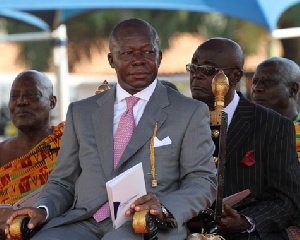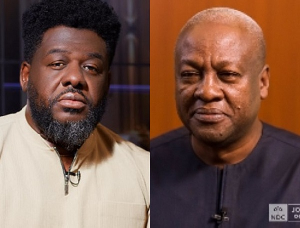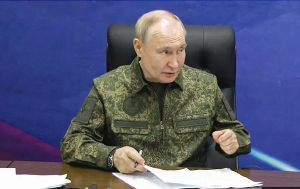The Asantehene, Otumfuo Osei Tutu II, has expressed optimism that Africa can overcome its obstacles if it adhered to good democratic practices.
He described upcoming elections in 16 African countries this year, as a step to consolidating Africa’s peace and economic growth.
He was peaking at an event in London on the topic: ‘Africa’s Democratic Path and the Search for Economic Transformation,’ that had in attendance, Ghana’s former President, John Agyekum Kufour, Members of the Houses of British Parliament, the Diplomatic Community, faculty of universities and some Ghanaians based in London.
The Asantehene said although Africa’s path to development was on course, political tensions in some of the countries could derail the progress.
He also expressed concern about happenings in Kenya in recent times, where the police arrested Members of Parliament for inciting ethnic tensions and in Ghana where radio panellists threatened members of the judiciary, and said these posed threats to democracy.
“The democratic change of governments through constitutional means, of which election is the means and not the end, has created a big space for peace and security of nations,” he said.
While referring to data from Africa’s think-tanks which, he said, had helped to enhance policy, outreach programmes and sensitisation, safe-guarding electoral processes with reforms in technology, he said they had also created a knowledge-based economy that did not exist two decades ago.
These benefits and innovations should, however, wean Africa from depending on multi-donor budget support and financing of electoral reforms and institutions, The Asantehene said, adding that “they are not permanent fixtures”.
He observed that the transformation from low to middle income economies comes with its attendant withdrawal of subsidies and uncertainty of shocks in the global economy.
Lord Paul Boateng of the House of Lords, hailed the Asantehene for his traditional leadership and contribution on education and agriculture.
He said education and agriculture played a significant role in the life of many Africans without which many would not have been where they were.
Unfortunately, he said, Africa’s agriculture is suffering from all fronts a situation which affects millions of dependants.
Ivor Agyeman-Duah, a participant described the Asantehene, Otumfuo Osei Tutu II, and Nigeria’s Professor Wole Soyinka, the guest of honour, as embodiments of Africa culture and unique traditional values.
Diane Abbott, Shadow Secretary of Health and Member of Parliament for North Hackney and Stoke Newington, who chaired the event, underscored cultural knowledge and understanding especially, literature improves one’s self worth and confidence as an African.
Prof. Soyinka said that all “is not lost in Africa notwithstanding challenges of nation-building and difficult economic situation some of which lead to violence”.
He touched on the violence in the Delta oil rich region of Nigeria and disturbances by militants as example of economic frustration and inequality among the people.
He said an international observatory team of which he is a member have held preliminary discussions with Nigeria’s President, Muhammad Buhari and the leadership of the militants, adding that “ in further consultation with the Archbishop of Canterbury, Justin Welby, some members of the British Parliament, the Asantehene, Osei Tutu II would be used as international mediation experts to bring peace in the Delta region.
In a related development, two books were launched at the occasion.
They are “May Their Shadows Never Shrink” by Wole Soyinka and the Oxford Professorship of Poetry authored by Ivor Agyeman-Duah, a Ghanaian writer, and Lucy Newlyn, a professor of English Language and Literature at the University of Oxford, and “All the Good Things Around Us- An Anthology of African Short Stories,” edited by Agyeman-Duah.
General News of Wednesday, 24 August 2016
Source: ghanaiantimes.com













